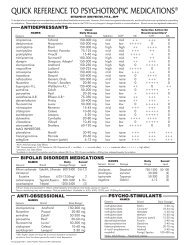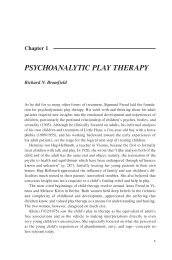IRAQ WAR CLINICIAN GUIDE
Iraq War Clinician's Guide - Network Of Care
Iraq War Clinician's Guide - Network Of Care
You also want an ePaper? Increase the reach of your titles
YUMPU automatically turns print PDFs into web optimized ePapers that Google loves.
Iraq War Clinician Guide 195 Appendix J<br />
P<br />
STRESS,TRAUMA, AND ALCOHOLAND DRUGUSE<br />
A NATIONAL CENTERFOR PTSD FACTSHEET<br />
Robyn D. Walser, Ph.D<br />
Drinking to Reduce Stress<br />
Many military personnel experience stress related to their deployment, service, and return home.<br />
These quite natural stress reactions can range from mild to severe and may be either short-lived or<br />
persist for a very long time. One common approach to managing stress that seems a simple and<br />
easy solution is use of alcohol or drugs. Military personnel, like civilians, may use alcohol and<br />
drugs as a way to relax or reduce anxiety and other bad feelings. In some cases, alcohol and drugs<br />
are not only used to decrease stress but also to manage severe symptoms that can arise from a<br />
traumatic experience in the warzone. You might find yourself drinking or using drugs for a variety<br />
of reasons when under stress or after trauma, including to:<br />
Help yourself sleep<br />
Relax<br />
Decrease emotional pain<br />
"Drown" your worries<br />
Escape present difficulties<br />
"Shake off" stress<br />
Decrease sadness<br />
Help yourself be around others<br />
Increase pleasurable experience<br />
Keep upsetting memories from coming to<br />
mind<br />
Calm anxiety<br />
Becoming Dependent on Alcohol/Drugs<br />
Initially, alcohol and drugs may seem to make things better. They may help you sleep, forget<br />
problems, or feel more relaxed. But any short-term benefit can turn sour fast. In the long run, using<br />
alcohol and drugs to cope with stress will cause a whole new set of very serious problems, as well<br />
as worsening the original problems that lead you to drink or use. Alcohol and drug abuse can<br />
cause problems with your family life, health, mental well-being, relationships, finances,<br />
employment, spirituality, and sense of self-worth.<br />
Think about family impact as an example. It's difficult to create good relationships when you are<br />
regularly drunk or high. Being intoxicated decreases intimacy and creates an inability to<br />
communicate well. Family members can feel rejected by someone who is always under the<br />
influence. In addition, witnessing someone's behavior while under the influence can be<br />
distressing. Children may not understand the aggressive behavior, the shutting down, or the hiding<br />
out that can occur along with substance use. The fallout from an accident or an arrest can have a<br />
long-lasting impact on a family. Alcohol and drug problems are dangerous for loved ones, because<br />
they are often linked with family violence and driving while intoxicated.<br />
When is Use of Alcohol a Problem?<br />
It is often hard to decide whether alcohol or drug use is becoming a problem. It can happen<br />
gradually, and sometimes can be hard to notice by the person who is using. Here are things that<br />
people sometimes say to themselves to convince themselves that they do not have a problem. Do<br />
you recognize any?<br />
- . ..---- -..,A<br />
DEPARTMENT OF VETERANS AFFAIRS<br />
a-.- -.-. -a -,.-<br />
NATIONAL CENTER FOR PTSD




